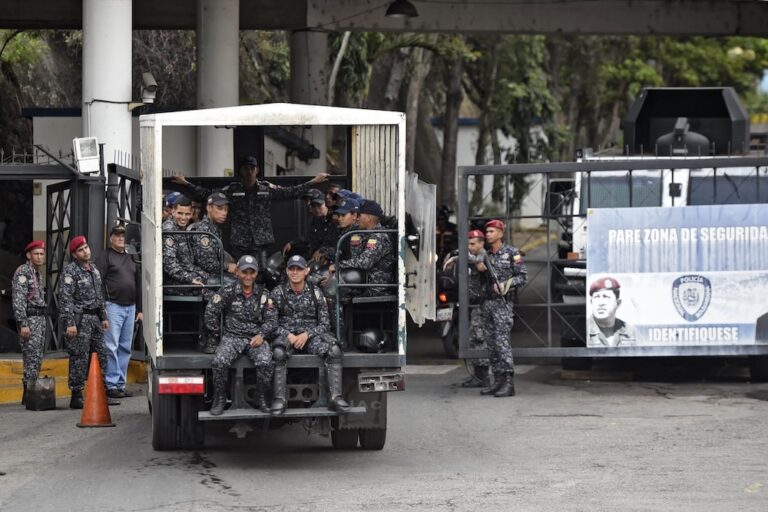(RSF/IFEX) – The following is a 12 April 2002 RSF press release: VENEZUELA Events of 11 April 2002 Media in the eye of the storm: one journalist killed, three wounded and several TV stations briefly off the air Reporters Without Borders has asked the Venezuelan authorities to thoroughly investigate and punish those responsible for shooting […]
(RSF/IFEX) – The following is a 12 April 2002 RSF press release:
VENEZUELA
Events of 11 April 2002
Media in the eye of the storm: one journalist killed, three wounded and several TV stations briefly off the air
Reporters Without Borders has asked the Venezuelan authorities to thoroughly investigate and punish those responsible for shooting and killing one journalist and wounding three others during disturbances in Caracas on 11 April. After a short break in transmission by privately-owned TV stations on 11 April, the government-controlled media – Venezolana de Television and the news agency Venpres – appear to have been forced to shut down on 12 April. RSF calls on the authorities to ensure that these media are able to resume their activities as quickly as possible and to protect journalists considered close to overthrown President Hugo Chávez from acts of revenge.
Photographer Jorge Tortoza, of the daily Diario 2001, was killed on 11 April while covering clashes between supporters and opponents of President Chávez in central Caracas. His driver said he had been shot in the head by a man in civilian clothes. Tortoza, who had worked for the paper for 17 years, was taken to Vargas hospital. He was seriously wounded and died shortly after being operated on. At that moment, great confusion reigned in the centre of the city where the pro-Chávez National Guard and the now pro-opposition city police were deployed. The army said Chávez supporters were also firing on demonstrators.
Three other press photographers were wounded in similar circumstances. They were Jonathan Freitas, of the daily Tal Cual, who was slightly wounded on the arm by a bullet, Enrique Hernández, of the state-controlled news agency Venpres, hit on the head by a stone and then in the stomach by a bullet that ricocheted off a wall, and Luis Enrique Hernández, of the daily Avance, who was still in hospital on 12 April.
President Chávez stopped privately-owned TV stations from transmitting on 11 April at about 4 p.m., saying they were “irresponsible,” had launched “a campaign of defamation” and were “inciting people to violence.” The order to shut them down was issued shortly after they refused instructions to only broadcast a speech by the president and instead split their screens in two, with Chávez speaking on one side of the screen and scenes of the demonstration being repressed broadcast on the other side. The president had demanded that his speech be broadcast just as the crackdown started. He cited Article 192 of the telecommunications law, which establishes the “cadena” (network) system, allowing the authorities to requisition air-time on all TV and radio stations that have a state broadcasting licence. The government had already used the “cadena” system on about 30 occasions between 8 and 10 April.
Only the government-controlled Venezolana de Television was exempted from the shutdown. The all-news TV station Globovision, along with CMT and Televen, went off the air for several minutes before returning by using satellite or cable facilities. Venevision and Radio Caracas TV, which had alternative means of transmission from the start, were able to broadcast uninterruptedly. Later in the day, the CMT studios were surrounded for several hours by personnel of the military intelligence service, the DIM.
Normal broadcasting facilities were restored at about 10 p.m. after the army allied itself with the opposition. At the same time, the government TV station was occupied by the National Guard, which had until then been protecting its installations, and its broadcasts were cut off. The Venpres news agency also stopped all work.
A general strike began on 9 April, after being called by the Venezuelan Workers’ Confederation (CTV) and the employers’ organisation Fedecámaras, in support of officials at the state oil company PDVSA who had been sacked by Chávez two days earlier. The strike was extended by a day and then indefinitely, late on 10 April. Violent clashes on the evening of 11 April resulted in a dozen deaths and nearly 100 people wounded and injured. That same evening, the army leadership rebelled against the president. Chávez, confined inside the presidential palace, was reportedly pressured by the army to write his resignation and was taken to Fort Tiuna, the capital’s main military base. Immediately afterwards, Fedecámaras president Pedro Carmona announced he would head an interim government, saying he had been chosen by “agreement” among civil society groups and the armed forces leadership.


